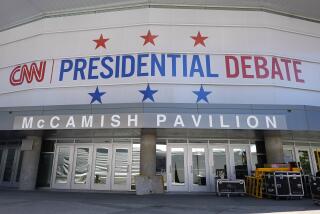Bush’s Advisors Defend Tax Cuts
WASHINGTON — President Bush’s top economic advisors said Sunday that the value of quickly implementing more tax cuts should outweigh Democrats’ concerns about future budget deficits that might be created by those cuts.
In separate appearances on television talk shows, the Bush officials also rejected the allegation--made last week by Senate Majority Leader Tom Daschle (D-S.D.)--that the president’s first wave of tax cuts had worsened the recession.
The sparring over tax policy and the recession open the midterm congressional election year, in which control of the Senate and the House hangs in the balance.
In Bush, the Republicans have a president whose popularity has soared with his handling of the battle against terrorism. Democrats, however, intend to hold Republicans accountable for the sagging economy, including an unemployment rate that has risen to a seven-year high of 5.8%. And, by decrying tax cuts that they say disproportionately benefit the affluent, the Democrats hope to position their candidates as more compassionate and fiscally responsible than Republican office-seekers.
It is in this context that the president, at an event in Ontario, Calif., on Saturday, referred to the Democrats by saying they would repeal his signature 10-year tax cut only “over my dead body.”
On Sunday, Bush’s senior economic team mounted a more detailed offensive.
Treasury Secretary Paul H. O’Neill dismissed as “just not credible” estimates that Bush’s $1.35-trillion tax cut package would eat up to 70% of the projected budget surpluses over the next decade. That package was passed by Congress and signed by Bush in June and resulted in $300-per-taxpayer rebates.
The full breadth of the tax cuts is subject to yearly congressional votes and presidential action.
“I think people who believe as a religion in 10-year numbers haven’t lived in the real economy,” O’Neill said on NBC’s “Meet the Press,” adding: “We need to deal with the here and now. We need to take the action that’s necessary now . . . to speed up the recovery.”
O’Neill estimated that the tax cuts already implemented account for “about” a 25% reduction to the projected budget surplus.
On Nov. 28, federal budget director Mitchell E. Daniels Jr. acknowledged that because of a “costly convergence of factors”--including the slowing economy, the Sept. 11 terrorist attacks and the tax cut--the federal budget would run at a deficit at least until 2005. Previously, the government had predicted years of surpluses.
O’Neill, who in his first year as Treasury secretary has not seemed to relish partisan sparring, appeared to undermine Bush’s rhetorical blast about Democrats wanting to raise taxes. Asked whether rescinding or postponing some of the $1.35 trillion in cuts should now be “on the table” for bipartisan negotiation, O’Neill said, “I have not seen anyone say they want to raise taxes.”
Bush’s secretary of Commerce, Don Evans, said Sunday that trying to stimulate the economy through tax cuts was more important than worrying about the erosion of projected budget surpluses.
“I think we need to focus on today and what’s happening right now,” said Evans, appearing on CNN’s “Late Edition.” “. . . Exactly what the budget is going to be over the next three to five years, you know, is pure speculation at this point. What we need to focus on is getting this economy moving again.”
Bush is backing an additional tax-cut package similar to one passed last month by the House, totaling about $110 billion. Daschle used his power in the Senate to block that legislation; the White House wants it revived.
More to Read
Get the L.A. Times Politics newsletter
Deeply reported insights into legislation, politics and policy from Sacramento, Washington and beyond. In your inbox three times per week.
You may occasionally receive promotional content from the Los Angeles Times.











